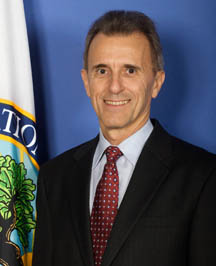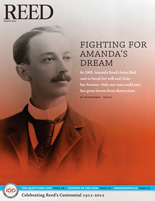
IRIS login | Reed College home Volume 90, No. 1: March 2011
Alumnus Profile
Eduardo Ochoa ’73
Can the Humanities Save the U.S. Economy?
By Romel Hernandez

Last year about this time, Eduardo Ochoa ’73 was comfortably ensconced as provost at Sonoma State University in California when he got a phone call “out of the blue.”
Turned out the Obama administration was considering him for a top post in the Department of Education. “This was so far removed from my radar screen, I didn’t know what to think,” he says. “It took me about 48 hours to know how I felt . . . Then I got very excited.”
After his confirmation by the Senate, he and his wife, Holly Byers Ochoa ’73, and their two sons packed up their belongings and moved to Washington, D.C., where he now serves as assistant secretary for postsecondary education.
Eduardo came well prepared for the sometimes surreal political environment inside the Beltway. Born and raised in Buenos Aires, he and his family emigrated in the mid-1960s to Portland, where his father found work running a medical lab. Eduardo likens the experience to that of a character in a science fiction movie, who wakes up to a different life.
But his experiences at Reed—spirited debates in Hum 110, an independent study of Hegel, and witnessing the campus upheavals of the 1960s and early 1970s—were nothing short of “transformational.”
“It has been the foundation for everything I’ve done since,” he says.
After graduating from Reed in both physics and philosophy, Eduardo wanted to become an engineer and return to Argentina to contribute to the country’s emerging democracy. But after attending graduate school in engineering at Columbia University, he cancelled his homecoming when a military junta seized power.
“What was really heartbreaking was to see what happened to Argentina,” he says, referring to the “Dirty War,” during which thousands of citizens, known as los desaparecidos, were killed or “disappeared” by their own government.
Eduardo decided to stay in the U.S. and changed course in his career. He earned a doctorate in economics from the New School for Social Research and became a professor at California State University–Los Angeles, eventually moving into administrative posts in the Cal State system, including the number two position at Sonoma State.
While at Sonoma, he turned to Reed for inspiration when he helped steer a new general education initiative. He modeled the school’s program on his own formative experience as a student in Hum 110, designing a multi-disciplinary lecture and seminar course where first-year students undergo a “rigorous intellectual experience” by engaging with their professors and peers.
His leadership at Sonoma State caught the eye of the Obama administration, which tapped him for a key role in the president’s initiatives on higher education.
Eduardo currently oversees an array of federal programs, such as TRIO, a college outreach program for disadvantaged students. His office is also leading a major effort dubbed “Program Integrity,” which aims to protect students from abusive practices in higher education and overhaul guidelines for federal student aid.
President Obama has set an ambitious goal of making sure the U.S. has the highest college graduation rate in the world by 2020. (Canada ranks number one.) To accomplish this, the department wants to become an “engine of innovation,” Eduardo says. But how to expand opportunity when resources are so tight? “We’ve got a disconnect,” he explains, “between the resources available . . . and this goal that would require colleges to increase capacity.”
Ultimately, he says, institutions must look to new ways to increase efficiency—anathema to many in academia. “This is high time for us to come to grips with that, and it will take a cultural transformation of higher ed,” he says. “As an engineer and an economist, I find it hard to believe that learning processes are immune to . . . doing things more efficiently.”
At the same time, he points out that education isn’t just about workforce development. Increasing access to college, he says, also drives socioeconomic equity and ultimately strengthens the “civic fabric of our democracy.”
Eduardo believes that educators across the spectrum could learn something from places such as Reed. “I very much support the notion that a liberal arts foundation to all higher education—even professional programs—is more important than ever.”


LATEST COMMENTS
steve-jobs-1976 I knew Steve Jobs when he was on the second floor of Quincy. (Fall...
Utnapishtim - 2 weeks ago
Prof. Mason Drukman [political science 1964–70] This is gold, pure gold. God bless, Prof. Drukman.
puredog - 1 month ago
virginia-davis-1965 Such a good friend & compatriot in the day of Satyricon...
czarchasm - 4 months ago
John Peara Baba 1990 John died of a broken heart from losing his mom and then his...
kodachrome - 7 months ago
Carol Sawyer 1962 Who wrote this obit? I'm writing something about Carol Sawyer...
MsLaurie Pepper - 8 months ago
William W. Wissman MAT 1969 ...and THREE sisters. Sabra, the oldest, Mary, the middle, and...
riclf - 10 months ago